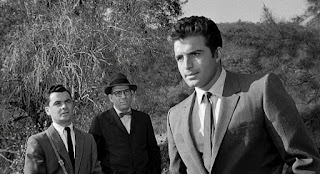 |
| Craig Stevens as Peter Gunn |
PETER GUNN Season 1. 1958.
"
I hear when she wants to look at pictures of her friends, she just drops into the post office." -- Mother
The action of this private eye series, which was created by Blake Edwards, takes place in an unnamed coastal city. The first season consists of 38 half hour black and white episodes. The central location is a waterfront night club called Mother's [after the owner, "Mother," played by hefty Hope Emerson], which Gunn uses as an office, despite the fact that he is highly successful at his trade -- judging from the way he throws fifty dollar bills around to various sources on virtually every episode. Gunn (Craig Stevens) is not a comparative "lout" like
Mike Hammer, but is cut from the same urban cloth as Richard Diamond, albeit west coast style. The other regulars on the show, besides Emerson, are Herschel Bernardi as Lt. Jacoby, who practically seems like Gunn's unofficial partner [stretching credulity], and Lola Albright as his girlfriend and a singer at Mother's. [Although Albright is very pretty and a competent actress, and has a pleasant singing voice, as a vocalist she is hopelessly bland, singing every song with the same inflection and lack of panache.] Albright's character, Edie, seems a bit childish at times, when she gets jealous over practically every female client of Gunn's. Although no one could ever accuse Stevens of being a "great" actor, he's fine as the "cool" [i.e. rather unemotional] Gunn [or is Gunn unemotional because he's played by Stevens?], but when he's given a chance to show some versatility, such as an episode in which he pretends to be a naive country boy, he delivers the goods. Bernardi is quite good as the cop; other semi-regulars include Billy Barty as stool pigeon Babby, and Morris D. Erby, who shows up late in the season as the likable and highly positive black police officer Sgt. Davis. Like most fifties detective programs,
Peter Gunn could be fairly violent at times, and there are some wonderful fist fights and well-choreographed action sequences.
While
Peter Gunn is not quite as good as the aforementioned
Mike Hammer, most of the episodes are at least of a "B" quality and some much better. Among the more memorable episodes are "The Frog," in which an old lady (Jean Inness) wants revenge for the killing of her friend and companion (Whit Bissell scores as a mobster); "Death House Testament," in which an inmate tells Gunn about some money; the borderline homoerotic "The Jockey," with an excellent Frankie Darro and Robert Gist; "The Lederer Story" involving skulduggery on a yacht with a family headed by a notable Otto Waldis [who was in everything from
Attack of the 50 Foot Woman to
Judgment at Nuremberg]. An especially delectable Mara Corday is featured in "Keep Smiling;" "Skin Deep" involves a missing sister and a gigolo; "Family Affair" features a death plot against a wealthy old man (John Hoyt); "Killer from Nowhere" spotlights Wesley Lau from
Perry Mason; and "The Painting" concerns a plot to "embarrass" a senator via his philandering and desperate wife. The three best first-season episodes, arguably, are ""Pay Now, Kill Later," with Torin Thatcher as a man wrongly convicted of the murder of a business partner who's actually still alive; "Vendetta," in which Edie is shot by a man bent on vengeance against Gunn; and especially "Love Me to Death," a twisted tale with Jeannette Dolan as a wealthy spinster and Robert H. Harris as a fortune hunter. Directors for the series include Boris Sagal [
Mike Hammer], Lamont Johnson, the aforementioned Robert Gist, and even Jack Arnold
[
Tarantula].
And then there's that sensational, sexy theme music by Henry Mancini, which seems to be fondly remembered by people who can barely remember the show or have never even seen it!
Verdict: Okay, maybe not a
great show like
Perry Mason, but often very entertaining and well-done. ***.



